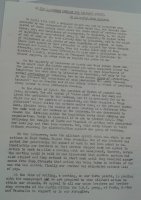Lo Siento.
Second As Farce
I agree with them up there, very interesting. And I wish you all the best with your viva, whatever that is.
Thanks, it's the examination for my doctoral thesis (which is what I did all this research for).
a couple of things I'd reflect on, though it's your specialist subject and I'm loathe to do more than try and learn.
First the context: British Leyland- 150,000+ workers, 40% of the British car market- went bust and was nationalised in 1975. 10 years later it had collapsed into ruin and many tens of thousands had lost their jobs. Is that a fair summary?
Give or take. BL didn't collapse into ruin, it stumbled on as a nationalised company, first as Austin-Rover (1982) then as Rover Group (1986), with bits and pieces being sold off along the way (the government disposed of the last of it to BAE in 1988). Parts of it still exist (Swindon and Cowley as part of BMW Mini, Solihull as part of Jaguar Land Rover).
I don't know what period your detailed reading covers, but any brief googling about the later 70s will throw up histories pinning the blame on appalling management, on inept political leadership (ie Callaghan, who came from a TU background and led the attack on In Place of Strife), on particularly badly designed cars, on the energy crisis, worldwide inflation, etc etc. But they all seem to agree that industrial relations were a contributory factor, with iro a million or so days per year production affected by strike action.
This contemporary account says "For manual workers in the Cars division alone there are currently 58 bargaining units and 324 pay rates". How much of what happened really related to closed shop demarcation and differentials I don't know, but whilst the figures you gave are important, it's worth remembering that it all ended in tears.
Well, first I'd say that this is a very different question to the original one posed around differentials. It's also a question I don't really address in my work, which is mainly about workplace cultures and shop-floor union organisation. If I were to address it though, I'd point out that although BL does have a lot of strikes (more than 1.6m striker days a year 1970-78 in fact), it is by no means alone in that regard, either within Britain or globally. If tranquil industrial relations was a pre-requisite for factories surviving the 1970s then there'd be no European/US car firms left other than the German and Swedish ones by now.
We all know what happened in 1979, the almost entirely negative effects of which are still reverberating. It would be a bit hard to pretend that the events that kept the car industry in the news week after week, month after month for years didn't have some effect in prompting some w/c voters to swing to the Tories (eg both Oxford, including Cowley, and Brum Northfield, inc Longbridge, went from Lab to Tory between '74 and '79, the latter with a 13% swing).
You don't have to be an arch-capitalist to wonder whether, in retrospect, it was all such a great idea.
Difficult to unpick that one really. It's a Labour government that starts rationalising BL (under Michael Edwardes from 1977) and Callaghan's administration is consistently critical of motor industry strikes (in fact Labour is in general throughout the post-war period). Also, the Tory election campaign in 1979 is less anti-union than is often imagined after the fact, so I'd say the "car workers voted Tory to end union militancy" is a difficult one to prove.
Last edited:





